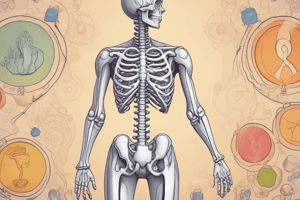Podcast
Questions and Answers
Which of the following clients would most likely benefit from calcium supplementation?
Which of the following clients would most likely benefit from calcium supplementation?
- A 40-year-old male with hyperlipidemia
- A 55-year-old postmenopausal woman with a family history of osteoporosis. (correct)
- A 10-year-old child with a fractured ulna.
- A 30-year-old male with a history of hypertension.
A client taking calcium carbonate as an antacid reports persistent heartburn. What is the most appropriate instruction for the nurse to provide regarding the timing of the medication?
A client taking calcium carbonate as an antacid reports persistent heartburn. What is the most appropriate instruction for the nurse to provide regarding the timing of the medication?
- "Take the medication on an empty stomach before meals."
- "Take the medication with grapefruit juice to enhance absorption."
- "Take the medication immediately before meals."
- "Take the medication 1 hour after meals, with a full glass of water." (correct)
A client is prescribed both a calcium supplement and a tetracycline antibiotic. What instruction should the nurse provide to the client to optimize the effectiveness of both medications?
A client is prescribed both a calcium supplement and a tetracycline antibiotic. What instruction should the nurse provide to the client to optimize the effectiveness of both medications?
- Administer the calcium supplement 1 hour before or 1 to 2 hours after the tetracycline antibiotic. (correct)
- Take both medications together with food to minimize gastrointestinal upset.
- Discontinue the calcium supplement while taking the tetracycline.
- Take the calcium supplement at least 4 hours before the tetracycline.
A client taking high doses of calcium supplements and vitamin D reports nausea, vomiting, and increased thirst. Which of the following electrolyte imbalances should the nurse suspect?
A client taking high doses of calcium supplements and vitamin D reports nausea, vomiting, and increased thirst. Which of the following electrolyte imbalances should the nurse suspect?
A client with lactose intolerance is considering taking calcium supplements. Which form of calcium supplement might be most appropriate for this client?
A client with lactose intolerance is considering taking calcium supplements. Which form of calcium supplement might be most appropriate for this client?
The nurse is caring for a client receiving intravenous calcium gluconate. Which of the following assessments is most important to monitor for during the infusion?
The nurse is caring for a client receiving intravenous calcium gluconate. Which of the following assessments is most important to monitor for during the infusion?
A client with a history of kidney stones is prescribed calcium carbonate as an antacid. What information should the nurse prioritize when educating this client?
A client with a history of kidney stones is prescribed calcium carbonate as an antacid. What information should the nurse prioritize when educating this client?
The nurse is reviewing a client's medication list and notes the client is taking both calcium carbonate and a glucocorticoid. What is the most important consideration regarding the administration of these medications?
The nurse is reviewing a client's medication list and notes the client is taking both calcium carbonate and a glucocorticoid. What is the most important consideration regarding the administration of these medications?
A client taking calcium supplements reports nausea, vomiting, and increased urine output. Which electrolyte imbalance should the nurse suspect?
A client taking calcium supplements reports nausea, vomiting, and increased urine output. Which electrolyte imbalance should the nurse suspect?
A client is prescribed a calcium carbonate supplement. What instruction should the nurse provide to maximize absorption?
A client is prescribed a calcium carbonate supplement. What instruction should the nurse provide to maximize absorption?
A client taking a glucocorticoid medication is newly prescribed a calcium supplement. What is the nurse's priority instruction to the client?
A client taking a glucocorticoid medication is newly prescribed a calcium supplement. What is the nurse's priority instruction to the client?
A client with a history of kidney stones is prescribed a calcium supplement. What is the most important instruction the nurse should give this client?
A client with a history of kidney stones is prescribed a calcium supplement. What is the most important instruction the nurse should give this client?
A client is prescribed both a calcium supplement and digoxin. What potential interaction should the nurse monitor for?
A client is prescribed both a calcium supplement and digoxin. What potential interaction should the nurse monitor for?
A client is ordered to receive 1000mg of calcium daily in divided doses. Which of the following instructions should the nurse provide to ensure optimal absorption?
A client is ordered to receive 1000mg of calcium daily in divided doses. Which of the following instructions should the nurse provide to ensure optimal absorption?
Your patient asks you about the difference between calcium citrate and calcium carbonate. Which of the following is the most accurate response?
Your patient asks you about the difference between calcium citrate and calcium carbonate. Which of the following is the most accurate response?
A patient is taking thyroid hormones, tetracycline, and quinolone antibiotics in addition to a calcium supplement. They ask you for the best way to take them to maximize the absorption of all medications. What is your best response?
A patient is taking thyroid hormones, tetracycline, and quinolone antibiotics in addition to a calcium supplement. They ask you for the best way to take them to maximize the absorption of all medications. What is your best response?
A patient reports that they have been experiencing constipation since starting calcium supplements. Which of the following interventions is most appropriate to recommend?
A patient reports that they have been experiencing constipation since starting calcium supplements. Which of the following interventions is most appropriate to recommend?
A client with slow gastric motility is prescribed a calcium supplement. What is the rationale for administering this medication with caution?
A client with slow gastric motility is prescribed a calcium supplement. What is the rationale for administering this medication with caution?
Flashcards
Calcium Citrate
Calcium Citrate
Used for calcium replacement as a dietary supplement.
Calcium Carbonate
Calcium Carbonate
Used as a calcium supplement and primarily as an antacid.
Calcium Supplements
Calcium Supplements
Provides a non-dietary source of calcium.
Vitamin D
Vitamin D
Signup and view all the flashcards
Hypercalcemia Manifestations
Hypercalcemia Manifestations
Signup and view all the flashcards
Hypercalcemia Risks
Hypercalcemia Risks
Signup and view all the flashcards
Calcium Supplement Monitoring
Calcium Supplement Monitoring
Signup and view all the flashcards
Calcium Supplement Timing
Calcium Supplement Timing
Signup and view all the flashcards
Preventing Constipation with Calcium
Preventing Constipation with Calcium
Signup and view all the flashcards
Calcium Supplement & Kidney Stones
Calcium Supplement & Kidney Stones
Signup and view all the flashcards
Calcium & Other Medications
Calcium & Other Medications
Signup and view all the flashcards
Calcium-Based Antacids
Calcium-Based Antacids
Signup and view all the flashcards
Calcium Bioavailability
Calcium Bioavailability
Signup and view all the flashcards
Calcium Supplement Contraindications
Calcium Supplement Contraindications
Signup and view all the flashcards
Calcium & Digoxin
Calcium & Digoxin
Signup and view all the flashcards
Hypercalcemia & Digoxin Toxicity
Hypercalcemia & Digoxin Toxicity
Signup and view all the flashcards
Foods Decreasing Calcium Absorption
Foods Decreasing Calcium Absorption
Signup and view all the flashcards
Study Notes
- Calcium supplements are prescribed for hypocalcemia and individuals at risk of calcium deficiency, including adolescents, pregnant or breastfeeding women, postmenopausal women, and those with lactose intolerance or at risk of osteoporosis.
- Calcium carbonate is a key component in antacids used for gastric hyperacidity.
- Calcium supplements fall under the classification of Mineral and Electrolyte Supplements
Prototype Medications
- Calcium citrate is mainly used for calcium replacement as a dietary supplement.
- Calcium carbonate is primarily used as an antacid but can also be used as a calcium supplement.
- Vitamin D enhances calcium absorption from the intestine and is often used with calcium supplements.
Expected Action
- Calcium supplements provide a non-dietary calcium source and can neutralize gastric acid.
Adverse Reactions
- Long-term use of calcium supplements or antacids, especially with vitamin D, can lead to hypercalcemia.
- Symptoms of hypercalcemia include nausea, vomiting, constipation, increased urine output (polyuria), and depression.
- Hypercalcemia can also lead to renal calculi (kidney stones) and hypercalciuria.
Interventions
- Monitor serum calcium levels in clients taking calcium supplements or antacids.
- Watch for manifestations of decreased gastric and intestinal motility (nausea, vomiting, constipation).
- Monitor urine output, flank pain, and blood in the urine.
Administration
- Calcium supplements can be administered orally or intravenously.
- Give calcium supplements 1 hour before or 1 to 2 hours after glucocorticoids, thyroid supplements, and tetracycline/quinolone antibiotics.
- Administer calcium-based antacids 1 hour after meals with a full glass of water, and again at bedtime.
Client Instructions
- Report symptoms of hypercalcemia to the provider, including nausea, vomiting, increased urine output, and depression.
- Prevent constipation by eating a high-fiber diet, increasing water consumption, and using laxatives if needed; fiber supplements or stool softeners may also be helpful.
- Report flank pain or blood in the urine due to the increased risk of kidney stones.
- Take calcium supplements 1 hour before or 1 to 2 hours after glucocorticoids, thyroid supplements, and tetracycline/quinolone antibiotics.
- Take calcium-based antacids 1 hour after meals and at bedtime, chew the tablet before swallowing, and drink a glass of water afterward.
- Do not take more than 600 mg of calcium at one time to ensure proper absorption.
- Read product labels for bioavailability information; calcium citrate and chewable forms have higher bioavailability.
- Consume the daily recommended amount of elemental calcium based on age and childbearing status.
Contraindications and Precautions
- Calcium supplements are contraindicated in clients with hypercalcemia or low phosphate levels.
- Use with caution in clients with a history of kidney stones or cardiac dysrhythmias.
- Administer cautiously to clients with slow gastric motility.
Interactions
- Excessive calcium supplements can increase the risk of digoxin toxicity.
- Glucocorticoids decrease calcium absorption.
- Calcium supplements can decrease the absorption of thyroid hormones, tetracycline, and quinolone antibiotics.
- Thiazide diuretics may increase the risk of hypercalcemia due to decreased calcium excretion.
- Foods like cereals, rhubarb, and spinach can decrease calcium absorption if consumed close to supplement intake.
Medication Questions
- Raloxifene and Alendronate are effective in both disease prevention and treatment of osteoporosis.
- Nausea is an indication of hypercalcemia.
Matching
- Raloxifene mimics the effects of estrogen on the bones.
- Alendronate reduces the number of osteoclasts.
- Calcitonin salmon raises calcium levels.
- Thiazide diuretics increase the excretion of calcium.
Studying That Suits You
Use AI to generate personalized quizzes and flashcards to suit your learning preferences.




